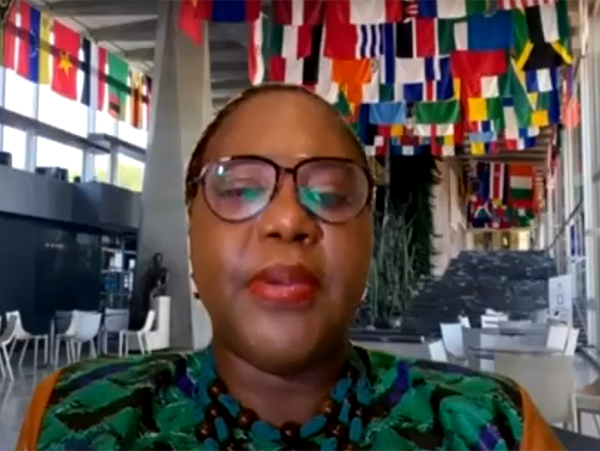
Transcript of the speech delivered by Professor Mark Taylor awarding the honorary degree, Doctor of Science to Dr Mwelecele Ntuli Malecela. January 2021
President, Chair of the Board, Director, students, ladies and gentlemen:
It is with great personal pleasure that I represent LSTM here today to recognise a truly inspirational figure in the fight against Neglected Tropical Diseases – Proud daughter of Tanzania and WHO Director of the Department of Control of Neglected Tropical Diseases:
Dr Mwelecele Ntuli Malecela
We share a common beginning to our careers in Neglected Tropical Diseases, some 30 years ago, working on the immunology of filariasis – Mwele as an MSc and PhD student in Professor David Denham’s laboratory, at some place called the London School for Hygiene and Tropical Medicine. I was further to the West at Imperial College working on vaccines for onchocerciasis – whatever happened to them?
I can’t help thinking that Mwele’s abilities to survive and thrive working with David Denham, must have honed her remarkable skills for diplomacy, tolerance and tact that enabled her current leadership of the Global response to NTDs.
Mwele left London to return to Tanzania to work as a Research Scientist in the National Institute for Medical Research at Amani and Dar Es Salaam culminating in her being the first woman to become Director General of Tanzania’s National Institute for Medical Research.
As Director of the National Programme to Eliminate LF. Mwele led the launch of mass treatment campaigns in Tanzania in 2000 – the start of a massive global scale-up to target the 120 million people affected by lymphatic filariasis. An approach which has trail blazed the control and elimination strategies for the majority of the 20 Neglected Tropical Diseases.
It was also this programme that kickstarted the long-lasting partnership between Mwele and LSTM. Financial and technical support for the Tanzanian LF Programme from LSTM’s LF Support Centre, headed by David Molyneux supported the launch of the programme on Mafia Island.
Tanzania is on track to eliminate LF as a public health problem by 2024, but this year has already seen this milestone achieved in Malawi, also with the financial and technical support of LSTM’s CNTD. It is not often you can celebrate the elimination of a tropical disease from an African country!
These examples show that the fight against LF is one of remarkable progress and is synonym for the career of Dr Malecela.
Before moving the WHO headquarters in Geneva, Mwele served as Director in the Office of the Regional Director, WHO Regional Office for Africa in Brazzaville, Congo.
The list of organisations, international committees, philanthropic initiatives and scientific publications is long and impressive, culminating in her leading role as Director of the Department of Control of Neglected Tropical Diseases and principal architect of WHO’s NTD Road Map for 2021-2030.
The new road map is a remarkable achievement in itself. It reflects and is framed by the growing commitment to achieving sustainable development goals (SDGs) and universal health coverage. It acknowledges how fragile and vulnerable programmes are to political instability, conflict, migration, climate change, epidemics/pandemics and anti-microbial resistance as barriers to achieving the goals laid out in the roadmap. Importantly, from the perspective of LSTM as an academic partner, the new roadmap fully embraces the need for research and innovation as fundamental enablers for programmatic progress for all NTDs.
The new road map also seeks to promote a paradigm shift in the way NTD’s are addressed by; 1) moving away from process driven targets to measures of the impact on public health, 2) replacing vertical and siloed disease specific programmes with holistic cross-cutting approaches integrated into national health systems with a people and community centred focus, and 3) to transfer programme ownership away from partner support and reliance on donor funding to country ownership with NTD’s integrated into national health plans and budgets.
Mwele’s approach and inclusiveness of the process she engaged upon with the global community was characteristic of her management style - as she piloted the Road Map through to endorsement by the World Health Assembly in November this year.
In a time where science, industry and Global Health policy have come together again to face the challenge of a pandemic, we can reflect here and celebrate another example of a phenomenal partnership between academia, pharmaceutical companies, governments, NGOs and other international organisations. Improving the lives of hundreds of millions of people. A global partnership, but one that would have been far less successful without the dedication, commitment and inspiring leadership of Dr Mwele Malecela.
As with all of you, I look forward to the day when we can welcome Mwele back to Liverpool to celebrate LSTM’s recognition of her remarkable achievements in person. Until then,
President, Chair of the Board, Director, students, ladies and gentlemen:
I present to you Dr Mwelecele Ntuli Malecela, as eminently worthy of the honorary degree, Doctor of Science